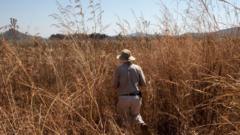Zimbabwe has begun its compensation payments to white farmers as part of a long-delayed agreement aimed at mending ties with the West.
Zimbabwe Initiates Compensation for White Farmers Affected by Land Reforms

Zimbabwe Initiates Compensation for White Farmers Affected by Land Reforms
Government's first payment under 2020 land compensation deal signals a shift in policy efforts.
The Zimbabwean government has officially commenced compensation payments to white farmers for land seized under a contentious land reform program initiated over two decades ago. An initial amount of US$3 million (£2.3 million) has been disbursed to cover the first 378 of the 740 farms approved for compensation under a comprehensive 2020 settlement agreement with former farm owners. This agreement established a total compensation commitment of US$3.5 billion (£2.6 billion) for the seized farmland, reflecting an ongoing effort to address the injustices of past colonial policies.
The 2000-2001 land grabs, while intended to rectify historical inequalities, wreaked havoc on Zimbabwe's economy and alienated the country from its traditional Western allies. Finance Minister Mthuli Ncube emphasized that this initial payout is just the beginning of Zimbabwe's commitment to compensate former farm owners for improvements made on the land rather than the land itself. The government sought to first prioritize compensation for foreign-owned farms through separate negotiations.
The payments are seen as a strategic move to not only restore dignity to displaced farmers but also to ameliorate Zimbabwe's standing in the international community. Many farmers have yet to sign on to the compensation deal, mostly retaining their title deeds, but interest is reportedly growing for participation.
As Zimbabwe grapples with a longstanding economic crisis marked by significant foreign debt and isolation from global financial systems, the government's re-engagement with issues surrounding land reform may indicate a willingness to mend strained relationships, particularly with Western nations. Analysts contend that these initial payments could be pivotal in revitalizing diplomatic and economic ties to facilitate Zimbabwe's eventual recovery.
Since its independence in 1980, Zimbabwe has struggled with the legacy of land reform, which prioritized redistributing land from a primarily white farming population to black farmers following the end of colonial rule. The legacy of former President Robert Mugabe's policies, which included violent land invasions, cast a long shadow over the country's subsequent efforts at reconciliation and economic stability. President Emmerson Mnangagwa has vowed to maintain the focus on land reform while also promoting these compensation initiatives as a viable path forward for Zimbabwe.
The 2000-2001 land grabs, while intended to rectify historical inequalities, wreaked havoc on Zimbabwe's economy and alienated the country from its traditional Western allies. Finance Minister Mthuli Ncube emphasized that this initial payout is just the beginning of Zimbabwe's commitment to compensate former farm owners for improvements made on the land rather than the land itself. The government sought to first prioritize compensation for foreign-owned farms through separate negotiations.
The payments are seen as a strategic move to not only restore dignity to displaced farmers but also to ameliorate Zimbabwe's standing in the international community. Many farmers have yet to sign on to the compensation deal, mostly retaining their title deeds, but interest is reportedly growing for participation.
As Zimbabwe grapples with a longstanding economic crisis marked by significant foreign debt and isolation from global financial systems, the government's re-engagement with issues surrounding land reform may indicate a willingness to mend strained relationships, particularly with Western nations. Analysts contend that these initial payments could be pivotal in revitalizing diplomatic and economic ties to facilitate Zimbabwe's eventual recovery.
Since its independence in 1980, Zimbabwe has struggled with the legacy of land reform, which prioritized redistributing land from a primarily white farming population to black farmers following the end of colonial rule. The legacy of former President Robert Mugabe's policies, which included violent land invasions, cast a long shadow over the country's subsequent efforts at reconciliation and economic stability. President Emmerson Mnangagwa has vowed to maintain the focus on land reform while also promoting these compensation initiatives as a viable path forward for Zimbabwe.




















